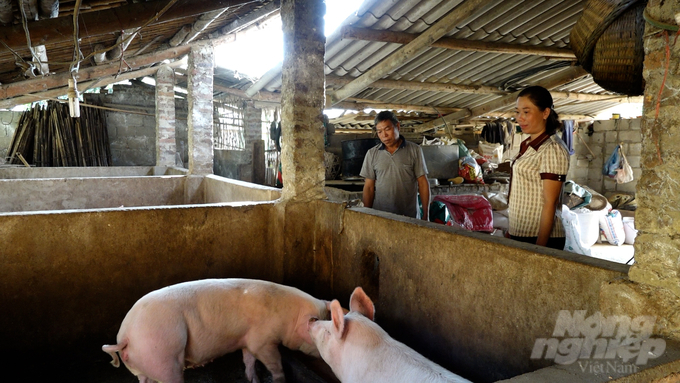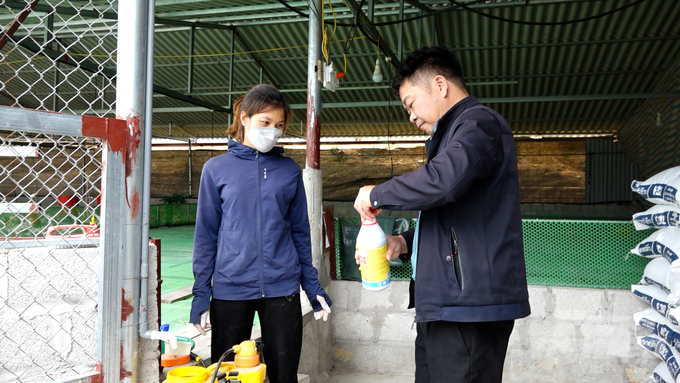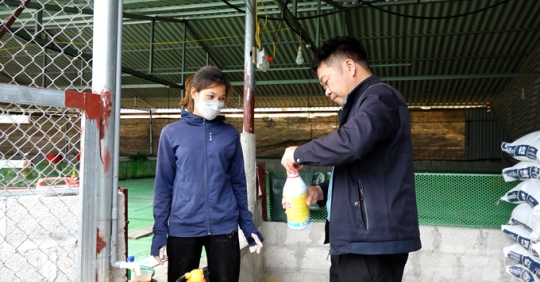
Ha Thi Minh advises people on how to take care of pigs after African swine fever. Picture: Vo Viet.
Lack of veterinary staff
After almost a year of care, the buffalo of Mr. Ly Van Chuc’s family also arrived in Long Thuong Hamlet, Xuan Long Township, Cao Loc County, Lang Son Province.
Early in the morning he prepared everything necessary to greet the calves, but the mother buffalo showed signs of difficulty giving birth. Mr. Chuc hastily called the municipal officials to help, but by the time everyone arrived it was too late.
To this day, Mr. Chuc cannot forget that day. “When I saw it wasn’t good I called Ms. Minh, who works as a veterinarian in the community. But when everyone got to the spot where the buffalo was dead. At that time, my family was still a poor household, waiting forever for the birth of buffalo to do business. “All was lost in the end,” Mr. Chuc choked.
That’s the story of three years ago, although everything has passed, but for Ms. Ha Thi Minh, an agroforestry and land registry officer in Xuan Long Municipality, it seems like it just happened. At the time, Ms. Minh had just received employment in the community and was also the first time she took the part-time job as a grassroots veterinarian.
“I know I don’t have the expertise to deliver buffalo. Call the county agricultural service center for help. It’s too far, we can’t get there in time. To this day, I feel extremely guilty.” Ms. Minh said.
When an outbreak of African swine fever occurred in Xuan Long Township, the community’s epidemic prevention work faced numerous shortcomings due to both lack of skilled personnel and inconvenient transportation. In addition, the propaganda to mobilize people to implement safe husbandry measures is not good, so epidemics still occurred in recent years, greatly affecting the economy of the people of this region 3 municipality.
As of 2021, there are only four households in two villages in Xuan Long Township affected by African swine fever. However, as of 2022, there are 33 households in 5/5 villages in the municipality affected by African swine fever, killing 152 pigs with a total weight of almost 7 tons.
At present, many households that are expanding their family economy towards animal husbandry have not yet boldly invested in rearing.
Mr. Tran Quoc Chinh, Secretary of the Party Committee and Chairman of the People’s Committee of Xuan Long Township, Cao Loc County, Lang Son Province, said, “The recent epidemic made us realize that there should be a full-time veterinary staff.” No matter how much we try it, without the expertise we can’t guarantee it.”
According to Ms. Vi Thi Hang, deputy head of the Ministry of Agriculture and Rural Development of Cao Loc District, there are currently four municipalities in the district that lack full-time veterinary staff. Therefore, the prevention of diseases in livestock is sometimes not up to date.
In the first quarter of 2023, the district also contracted pasteurellosis, which killed more than 20 buffalo and cows. While the number of vaccinated livestock in the district has not yet reached 30% of the total. The district currently has almost 15,400 herds of cattle, around 265,500 poultry, and livestock farming is increasingly developing in the direction of concentrated agricultural operations.
“Given the characteristics of a border district and many communities with special difficulties, the lack of veterinary personnel not only affects disease prevention, but also makes it difficult to spread and direct livestock breeding. The animals are bred in a sustainable way,” emphasized Ms. Hang.
According to statistics, there are currently 175/200 townships and cities with basic veterinary medicine in Lang Son Province. It is known that in some municipalities, due to the merging of administrative boundaries at the municipal level and large areas, the remuneration of municipal veterinary staff has not increased, partly due to the hard work and pressure of animal staff, but many people have given up their jobs. Work.
Due to the lack of full-time staff, some municipalities have delegated responsibility for veterinary care to cadastral officials or agri-forestry clubs or mass organizations that do not have professional training in animal husbandry and veterinary medicine.
Therefore, it is not possible to implement animal disease prevention, control and reporting measures at grassroots level, such as: B. Vaccination, treatment of animal diseases, diagnosis of animal diseases, guidelines for prevention, against animal diseases, etc.
Mr. Nguyen Van Cham, director of the Chi Lang District Agricultural Service Center, shared, “Now they work as low earners and earn more than 1 million a month.” Even church services are not enough for the family. There are two people in my district who have quit their jobs.

Officials from the Cao Loc District Agricultural Service Center conduct animal disease prevention and control training. Picture: Nguyen Thanh.
It’s difficult being a bride of a hundred families
It is also “hundreds of hard work” for the basic veterinarians who work in this profession. As a newcomer for three years, but Ms. Ly Thi Hue, a veterinarian in Nhan Ly Township, Chi Lang District, understands the difficulties and hardships of the grassroots workers.
While the village headman quickly tied the buffalo to the fence for the injection, Ms. Hue said, “Every time I come here, I have a village headman to help me.” Buffalo and cows are big and strong, I can’t use my hands pull but I go to the stable to inject it, it hurts and hurts.
But for Ms. Hue, the biggest difficulty is not only low income and large area, but also changing people’s consciousness.
To this day, Ms. Hue also cannot remember all the times she went to the village to vaccinate her cattle and then returned home, afraid of her relatives, afraid of being vaccinated for animals that could not reproduce.
Knowing the needs of her relatives, she went from house to house to mobilize people, inject vaccines to prevent and control disease in their livestock, and guide them in safe husbandry practices.
“This job is like a bride of a hundred families, it’s hard to do. It rained for a long time, now people have changed a lot. Pay attention to the care and fattening of livestock. When it’s the season, it’s time to take the initiative and call on the staff to spray. “Maybe I’m in debt with this job, my income isn’t enough for gas and breakfast, but I can’t quit the job,” Ms. Hue said.
Like Ms. Hue, Mr. Chu Van Khang has served as a community veterinarian in Hai Yen Township since 2007. After many salary and allowance adjustments, his allowance is now just over 1 million dong. To earn a living, he and his family stopped raising cattle and planted forests to create more fields.
Mr. Khang confided, “My community is dozens of kilometers away from the other village and full of hilly roads. For each injection, the village head must be reminded two days in advance and then leave early or wait until noon to receive the injection.
The relatives were informed, but by the time I went from house to house it was too late to release buffalo and cows into the fields. This job is very hard, if I didn’t love it I would have quit a long time ago.
And that is also the thought of the more than 170 employees who do basic veterinary work in Lang Son. Although the work pressure is high, they still try to support state administrations and people in disease prevention and control and on the way to sustainable animal production.
According to the Lang Son Province Livestock Production and Veterinary Medicine Subdepartment, the total number of cattle is about 300,000 head, and the poultry flock is more than 4.4 million head. The number of livestock is increasing, and the disease situation in the stock is becoming more and more complicated.
Mr. Nguyen Nam Hung, director of Lang Son Provincial Livestock Husbandry and Animal Health Subdepartment, said the subdepartment is gradually consolidating, consolidating and strengthening the capacity and operational efficiency of veterinary services and veterinary systems. In addition, the sub-department has supported the training of village veterinarians through projects, helping to strengthen the human resources of the veterinary system in disease surveillance and prevention at the facility.

